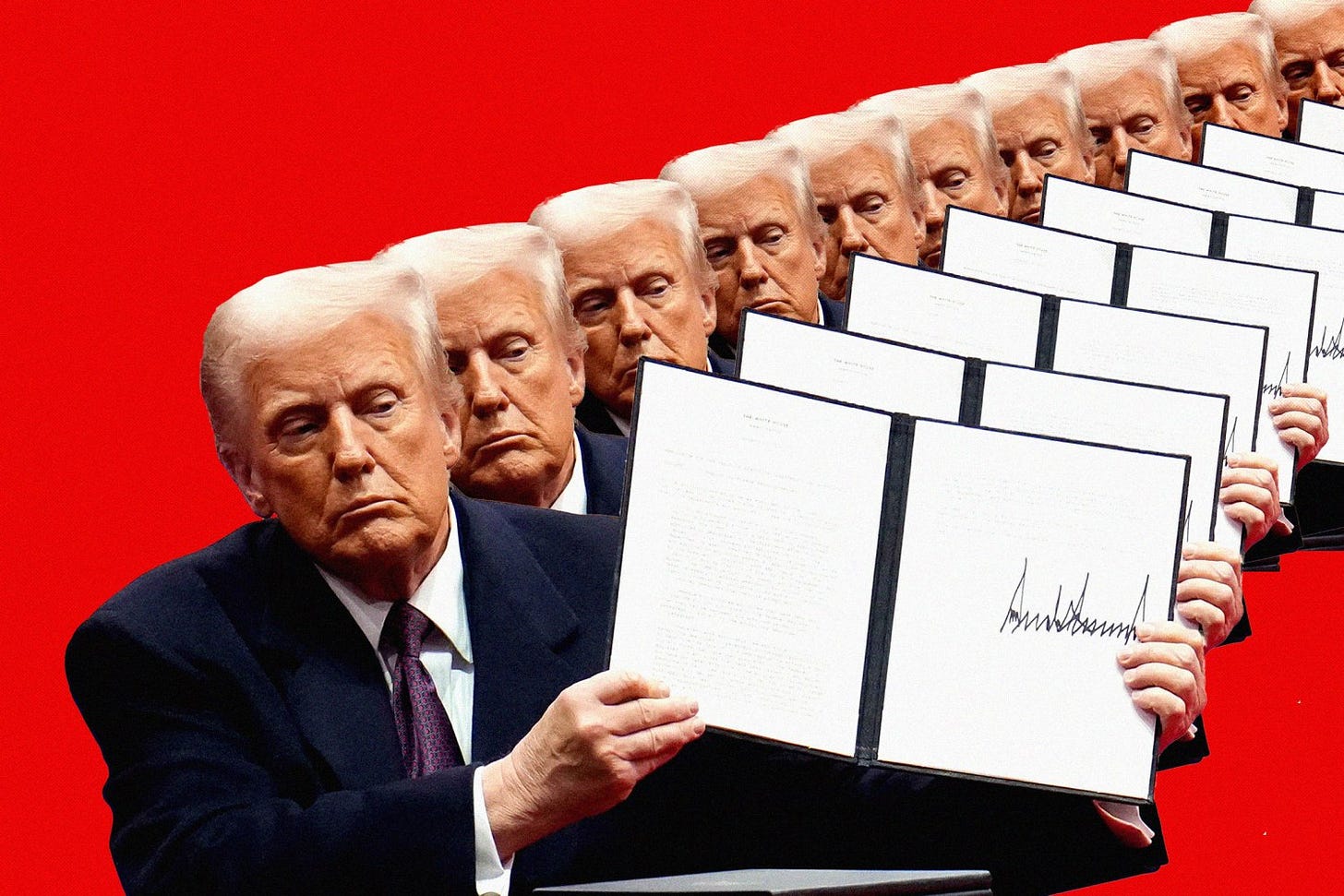The dying throes of a terminally ill country?
And the two constitutional changes needed to restore health
For a long time the constitution has needed major reform. We’ve seen the symptoms: the dysfunction, the conflicts of interest, the total distrust of government. But we haven’t known what changes to make. We’ve lacked real ideas. So we’ve shrugged, and settled, and stuck with the status quo.
But Trump’s presidency clarifies things. In just over two short months, he’s already pushed our system to such an extreme that we can start to see its real vulnerabilities. Trump is the ultimate stress test, and the diagnosis doesn’t look good. But to understand what’s wrong, we need to take a longer view. We need to imagine how our politics might develop if we continue down this road.
I’m not trying to predict what’s to come. I have no idea what’s to come. I’m only trying to show how things are escalating, and why, and what can be done about it.
So here’s one scenario that’s not too hard to picture:
Over the next few years, Trump’s gamble doesn’t pay off. Instead of making everyday Americans more prosperous, his measures lead to a breakdown. The tariffs lead to soaring prices. Global cooperation comes to a standstill. Basic government services fall apart — there just aren’t the people to provide them, and the promised “Apple Store-like” tech systems are never built (just think how challenging it was to roll out Obamacare in 2013).
But let’s imagine the breakdown isn’t catastrophic — it’s not the next Great Depression or World War 3 — just bad. Really bad. Some bumpy, painful, chaotic years and the administration is unable to course correct. People are angry. Things get heated.
So in 2028 the country elects Pete Buttigieg as the 48th president. He’s young, gay, and a war veteran who’s scrappy in a fight. Most importantly he’s not Trump or anyone who was part of his wrecking crew.
Now Buttigieg doesn’t win by huge margins —Trump still has a vice grip on his party — but he easily wins the electoral college and the popular vote and so declares that he has a ‘clear and resounding mandate’ by the American people. As a bonus, Dems flip enough seats to get majorities in both houses.
So the Democrats, again, control the levers of power. During the previous four years, they complained bitterly about Trump expanding presidential power, but they’re not complaining any more. Now that they’re behind the wheel, they like the government’s forceful new design. So they kick it into high gear and start speeding in the opposite direction.
And they just follow Trump’s roadmap but in reverse. On Day 1, Buttigieg declares the tariffs are off and America is ‘open for business’ again. Then his administration immediately moves to replace any Trump faithful in the government. They push legislation through to protect trans rights and expand trans representation in society. They institute mandatory DEI programs in all government agencies. And they declare war on climate change, pushing through a bigger, far more aggressive version of the Green New Deal.
Not only that though, they lean hard on right-wing institutions. They withdraw federal funding from conservative universities like Liberty and Brigham Young, demanding they institute DEI programs and put their “racist” Classics and American History departments into receivership. In fact, they make all government grants contingent upon instituting DEI programs.
And they certainly don’t like the news coming from the right-wing news outlets — it’s just the same divisive “Christian Nationalist” rhetoric that pushed the country to the brink of fascism during the Trump years — so they block them, not just from presidential briefings, but from all federal buildings. And of course they go after the conservative law firms that are fighting these actions in the courts.
Oh yeah: the courts. Did I mention that Buttigieg finally realizes his 2019 dream of packing the Supreme Court with liberal justices? He can’t change the existing court, so he just adds four new justices.
And to make sure there’s not a hint of pushback, Congress gets rid of the filibuster.
For the liberals that scenario might sound good. They can’t wait. It was Trump after all, who took off the kid gloves and started fighting dirty. If the Dems regain power in four years and hit back, then all the MAGA heads are just getting what they deserve.
And what do conservatives think of such a scenario? I’m guessing they hate it. For one, it’s missing the crucial insight that Trump is Good, while the Dems are Bad — after all, the Dems have almost destroyed America, and Trump is just doing what’s necessary to fix a broken system, right?
And I’m sure conservatives also hate the idea of the tables ever turning on them. But of course they will, and when they do they should be ready for the Dems to take the same aggressive actions. Fair is fair.
But regardless of how anyone feels about it: just imagine the whiplash from all that back and forth. A body can’t handle it.
Think of the economy alone. Think of all the businesses who move their factories and supply chains to America during Trump’s presidency, even though it’s more expensive to produce things here. Fast forward four years: there are no more tariffs, so those companies aren’t competitive any more. Of course the big ones go begging for subsidies — which they get because they’re “too big to fail” — but tons of little ones go under. And do we really imagine that the surviving behemoths move their factories back to Vietnam and Mexico? What if MAGA comes back to power in 2033? But still… those companies can’t compete without the tariffs protecting them. So what should they do?
And what about the universities and newspapers? Can they financially weather the storm when the government squeezes them? What about the chilling effect on teachers and students, editors and journalists? The message is clear: Don’t look up. Don’t stick out. Don’t say anything the administration doesn’t like.
So free speech and academic independence are pretty much muzzled.
At this point things look pretty dark. You still cheer when your party is in power, but you don’t sleep so well any more. There’s always a gnawing sense of insecurity at the bottom of your stomach. Because: Things could flip again in four years. And they probably will. And this just leads to a rising sense of desperation — the feeling that we need to crush the opposition. NOW. While we still can. Before they crush us.
Of course that’s a bleak scenario, and we’re not there yet — it’s still 2025 — but it’s not difficult to imagine. Trump is pushing so hard in one direction, why wouldn’t the Dems push back just as hard in the other? If this does happen, if we spiral into an era of “shove it down your throat” revenge politics where all of society’s institutions are weaponized to attack the other side, things probably won’t last long. Such actions would signify the death throes of a terminally ill country. And civil war would be the likely outcome.
That might sound alarmist — descending into civil war over the next decade? But maybe it’s not alarmist enough. It could happen much sooner.
But real changes can be made. There’s still time to de-escalate the situation, but only if we abandon the utopian fantasy that our side might still win. It won’t. No one will win. We won’t be able to force our views down our enemies’ throats. We won’t make them think like us. It’s a losing proposition.
What we can do though, is make it impossible for either side to even try. How? By making two major changes to our constitution: the separation of culture and state, and the separation of economy and state. Hear me out.
Right now our government has power over our economic and cultural institutions. It doesn’t have complete control — for instance, our predecessors recognized the need for academic and journalistic independence but, as we can see, the government can still squeeze universities and news outlets to make them bow their head and bend their knee.
So our predecessors recognized the need for these institutions to be independent, but they didn’t see it clearly enough — they didn’t create a proper wall separating culture and state. They spoke about independence, and we still speak about it today, because everyone wants to be free to think and speak their mind, without “fear or favor.” But that’s not the reality. The reality is that if the government can give and withdraw grants in science, art, and education, if it can fund and defund news outlets, and if it generally controls the whole system of public education, then of course we’re not free to research, write, or teach our children what we want. Which means we can’t think and express what we want. Instead, we have to look over our shoulder and align ourselves with what the government wants.
And if our enemies control the government? That means they tell us what we can think, teach, write, and research.
On the other hand, why should the government have power over the economy? Is Trump especially equipped to decide where factories are built, or what trade partnerships we enter into? Was Biden so equipped? Was Obama, or Bush? Why should they decide, and not the business people who are busy producing and distributing the actual goods?
But of course… business people can’t be trusted, right? We all know that self-interest is the engine of the economy, so they’ll just steal the food from right off your plate if they’re not watched and directed. We need the government to direct them.
Or maybe not. Maybe Adam Smith got it wrong. Maybe selflessness is actually the guiding principle of the economy. After all, the purpose of business is to meet needs, which draws us out of ourselves, which naturally makes us take an interest in other people, in what they need, in what they want to buy from us. The problem is: You need money to buy things, to express your needs, which is why we produce for the wealthy and not for the poor. But the economy is meant to meet everyone’s needs. So we need far stronger labor and property laws to provide a framework for this to happen.
And this brings us to the real point: Government is meant to provide the framework for business and culture to unfold. Period. It’s meant to provide the rules for the game, and it’s meant to referee the game, but it’s not meant to play it.
If some of the referees are also players, then the game is rigged. If players can bribe referees (through lobbying, campaign donations and the like), then the game is rigged. If the referees can give advantages to one side over the other, then the game is rigged. And when the game is rigged, then both teams are incentivized to try to control the game, to control the referees, to use their power to crush their opponents.
This creates a shitty game. And when tempers start flying, and everyone feels the game is rigged against them, they get violent.
Which is where we’re currently headed. And I know that separating culture, state, and economy — what’s known as “social threefolding” — sounds impossible, but that doesn’t really matter, because it’s necessary. It’s what society itself requires. There aren’t other options.
The basic fact is that government is different from culture and economy. They have different functions. And when one sector controls the other it creates toxicity and tumors in the social organism.
We can ignore this fact if we want. We can put a band-aid on the tumor — for instance, we can leave the system as it is and just give everyone a basic income. But in that case, nothing fundamental will have changed. The culture wars will continue to rage. The wealth gap will continue to widen. And the earth’s resources will continue to be laid waste.
In the end, we ignore reality at our own peril. We can only ignore it so long.
Yes, writers have to eat, but paywalls just punish low-income people, and why shouldn’t they have access to the writing and ideas they want?







The appeal of the threefold social order has always been there in theory. But as you've pointed out so well, we may well have reached the point where ideas like it will be our only alternative if we wish to avoid the demise of our country and society's great experiment.
Seth - you talk about the three spheres needing to be independent as per social threefolding, then use a referee as a metaphor. Players are not independent of referees in sports, nor the inverse.
The vast majority of MSM is owned by seven corporations. Social media is owned by a handful of players. How is threefolding, or your proposed constitutional amendments, going to rectify this?
I still don't understand how an independent economic realm is going to stop laying waste to the Earth, or what the word 'need' means to economists.